Filter by
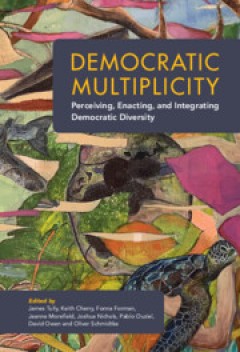
Democratic multiplicity : perceiving, enacting and integrating democratic div…
This edited volume argues that democracy is broader and more diverse than the dominant state-centered, modern representative democracies, to which other modes of democracy are either presumed subordinate or ignored. The contributors seek to overcome the standard opposition of democracy from below (participatory) and democracy from above (representative). Rather, they argue that through differen…
- Edition
- -
- ISBN/ISSN
- 9781009178372
- Collation
- xxi, 426p.
- Series Title
- -
- Call Number
- 321.8 DEM e

Cyber peace : charting a path toward a sustainable, stable, and secure cybers…
The international community is too often focused on responding to the latest cyber-attack instead of addressing the reality of pervasive and persistent cyber conflict. From ransomware against the city government of Baltimore to state-sponsored campaigns targeting electrical grids in Ukraine and the U.S., we seem to have relatively little bandwidth left over to ask what we can hope for in terms …
- Edition
- -
- ISBN/ISSN
- 9781108954341
- Collation
- xix, 243p. ; ill.
- Series Title
- -
- Call Number
- 363.325 SHA c

Feminist IR in Europe : knowledge production in academic institutions
The aim of this open access book is to take stock of, critically engage, and celebrate feminist IR scholarship produced in Europe. Organized thematically, the volume highlights a wealth of excellent scholarship, while also focusing on the politics of location and the international political economy of feminist knowledge production. Who are some of the central feminist scholars located in Europe…
- Edition
- -
- ISBN/ISSN
- 9783030919993
- Collation
- ix, 174 p.
- Series Title
- -
- Call Number
- 327.0704 STE f
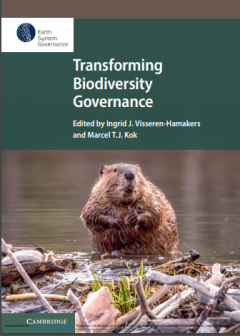
Transforming Biodiversity Governance
Over fifty years of global conservation has failed to bend the curve of biodiversity loss, so we need to transform the ways we govern biodiversity. The UN Convention on Biological Diversity aims to develop and implement a transformative framework for the coming decades. However, the question of what transformative biodiversity governance entails and how it can be implemented is complex. This bo…
- Edition
- -
- ISBN/ISSN
- 9781108856348
- Collation
- xviii, 390p,: ill
- Series Title
- -
- Call Number
- 346.04695 ING

The Right to Science
That everyone has a human right to enjoy the benefits of the progress of science and its applications comes as a surprise to many. Nevertheless, this right is pertinent to numerous issues at the intersection of science and society: open access; 'dual use' science; access to ownership and dissemination of data, knowledge, methods and the affordances and applications thereof; as well as the role …
- Edition
- -
- ISBN/ISSN
- 9781108776301
- Collation
- xi, 324p,: ill
- Series Title
- -
- Call Number
- 342.0853

The Power of Standards
Standards often remain unseen, yet they play a fundamental part in the organisation of contemporary capitalism and society at large. What form of power do they epitomise? Why have they become so prominent? Are they set to be as important for the globalisation of services as for manufactured goods? Graz draws on international political economy and cognate fields to present strong theoretical arg…
- Edition
- -
- ISBN/ISSN
- 9781108759038
- Collation
- vii, 270p : ill
- Series Title
- -
- Call Number
- 658.562 JEA
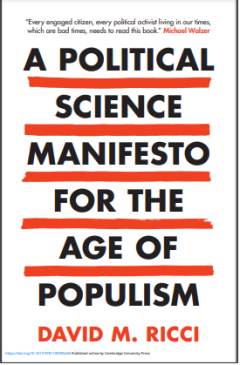
A Political Science Manifesto for the Age of Populism
Populism and authoritarian-populist parties have surged in the 21st century. In the United States, Donald Trump appears to have become the poster president for the surge. David M. Ricci, in this call to arms, thinks Trump is symptomatic of the changes that have caused a crisis among Americans - namely, mass economic and creative destruction: automation, outsourcing, deindustrialization, globali…
- Edition
- -
- ISBN/ISSN
- 9781108785440
- Collation
- x, 258p: ill,
- Series Title
- -
- Call Number
- 320.473 DAV
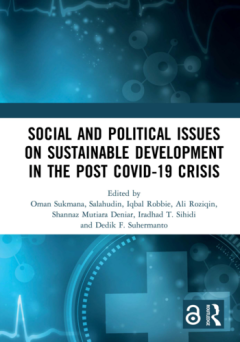
Social and political issues on sustainable development in the post covid-19 c…
As a threat, a pandemic has indirect implications for social, economic and political conditions both at domestic and international levels. Thus, collective and comprehensive efforts are needed in responding to and preventing the expansion of infections caused by the virus, including Covid-19. This international conference provides the discourse on social, economic as well as political issues re…
- Edition
- -
- ISBN/ISSN
- 9781003263586
- Collation
- xiv, 367 p. : ill
- Series Title
- -
- Call Number
- 338.9598 SUK s
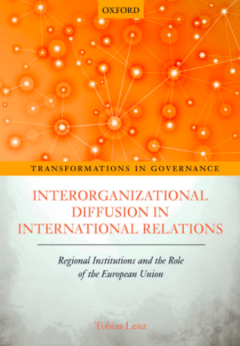
Interorganizational diffusion in international relations : regional instituti…
How and under what conditions does the European Union (EU) shape processes of institution building in other regional organizations? Interorganizational Diffusion in International Relations: Regional Institutions and the Role of the European Union develops and tests a theory of interorganizational diffusion in international relations that explains how successful pioneer organizations shape insti…
- Edition
- 1
- ISBN/ISSN
- 9780198823827
- Collation
- 255p
- Series Title
- -
- Call Number
- 327.4 LEN i
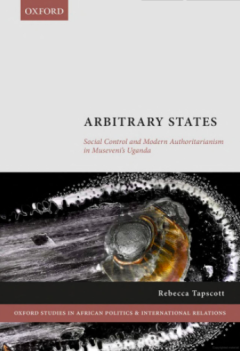
Arbitrary states : social control and modern authoritarianism in Museveni's U…
This book places literature on the post-colonial African state in conversation with literature on modern authoritarianism, using this to frame over ten months of qualitative field research on Uganda's informal security actors - including vigilante groups, local militias, and community police. Based on this research, the book presents an original framework - called 'institutionalized arbitrarine…
- Edition
- 1
- ISBN/ISSN
- 9780198856474
- Collation
- 230p
- Series Title
- -
- Call Number
- 306.2089935 TAP a
 Computer Science, Information & General Works
Computer Science, Information & General Works  Philosophy & Psychology
Philosophy & Psychology  Religion
Religion  Social Sciences
Social Sciences  Language
Language  Pure Science
Pure Science  Applied Sciences
Applied Sciences  Art & Recreation
Art & Recreation  Literature
Literature  History & Geography
History & Geography